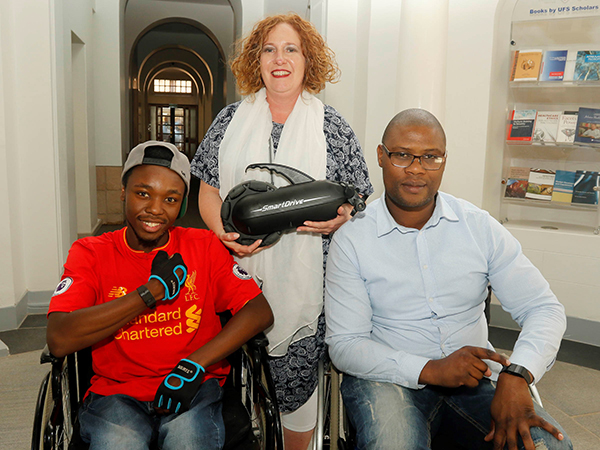Latest News Archive
Please select Category, Year, and then Month to display items
27 October 2025
|
Story Sefako Mokhosoa
|
Photo Supplied
 Ten Grade 12 learners from Mampoi Secondary School in Phuthaditjhaba.
Ten Grade 12 learners from Mampoi Secondary School in Phuthaditjhaba.
On 1 October 2025, the Projects and Innovation Directorate in the Faculty of Education at the University of the Free State (UFS) proudly hosted a certificate ceremony to honour ten Grade 12 learners from Mampoi Secondary School in Phuthaditjhaba on the Qwaqwa Campus. These learners completed a Skills Development Initiative and Workshop Series focused on digital literacy and ICT skills – a programme designed to equip rural youth with the tools they need to thrive in a digital world.
The initiative, which ran from May to August 2025, was made possible through a strategic partnership with BANKSETA to bridge the digital divide in rural communities. The learners received hands-on training in essential digital tools. Each learner also received a tablet to support continued learning and personal growth beyond the classroom.
The Director of the office in the Faculty of Education, Dr Kwazi Magwenzi, stressed that digital skills promote independence and self-directed learning. “Grade 12 is a time when learners should manage their studies, meet deadlines, and explore their options,” she said. “Digital fluency supports that autonomy. It enables learners to use online research, interactive tools, e-learning, and collaboration platforms to make learning more effective, flexible, and aligned with their pace and style. In Grade 12, where the stakes are high – with exams, tertiary entrance, and career choices – this ability helps learners become more self-directed, confident, and equipped.”
The programme not only built learners’ confidence in using ICT tools for learning and communication but also prepared them for the technologically driven environments they will encounter in institutions of higher learning.
Beyond developing digital skills, the project offered learners valuable exposure to the university environment, as their training took place on campus. Inspired by the success of this pilot, the Faculty of Education now aims to expand the initiative to reach more schools and learners across the region. The vision is to scale up access to digital education and empower more young people in rural areas with the skills necessary for academic and professional success.
This ceremony marked the conclusion of a successful training programme and the beginning of a long-term commitment to digital empowerment and lifelong learning in rural communities.
SmartDrive devices give UFS wheelchair users more independence
2017-12-01

From the left, are: David Mashape; Martie Miranda, Head of the
Center for Universal Access and Disability Support at the UFS;
and Lawrence Qamba, celebrating the recent acquisition
of two SmartDrive Power Assist devices.
Photo: Johan Roux
Students who make use of wheelchairs at the University of the Free State (UFS) will now be able to move around campus more independently than before. This is thanks to two SmartDrive Power Assist devices acquired by the university.
Accessibility is very important to the institution and with these devices clipping onto a manual wheelchair to make it motorised, students will not have to ask for help that often. It will assist them in overcoming obstacles they face every day.
Different surfaces pose different challenges
According to Martie Miranda, Head of the Center for Universal Access and Disability Support (CUADS), one of the most important advantages of the SmartDrive machines is that it enhances the independence of students. The devices were bought with funds received from the Department of Higher Education and Training specifically allocated for accessibility and infrastructure.
“While the UFS is addressing inaccessibility on its campuses, which will take time, this will help to motorise wheelchairs for wheelchair users to move around more easily. Students can now move around independently without necessarily asking for help, for example, to get up very steep ramps.” Miranda says some surfaces, such as grass and gravel, has its own unique challenges for wheelchair users.
A few years coming
The SmartDrive devices are operated by a Bluetooth watch. By tapping twice on the chair or clapping twice, the motor propels the wheelchair forward and stops when tapped twice, while also braking with one’s hands. The speed can also be controlled by the user. The machines use rechargeable batteries, with a fully charged battery lasting up to 15 hours.
Acquiring the devices was a process of a few years, and CUADS is happy to finally employ them to the benefit of their students. Miranda says the determination and support of Prof Nicky Morgan, Vice-Rector: Operations, and the assistance of Nico Janse van Rensburg, Senior Director: Top Management, were instrumental in buying the devices.